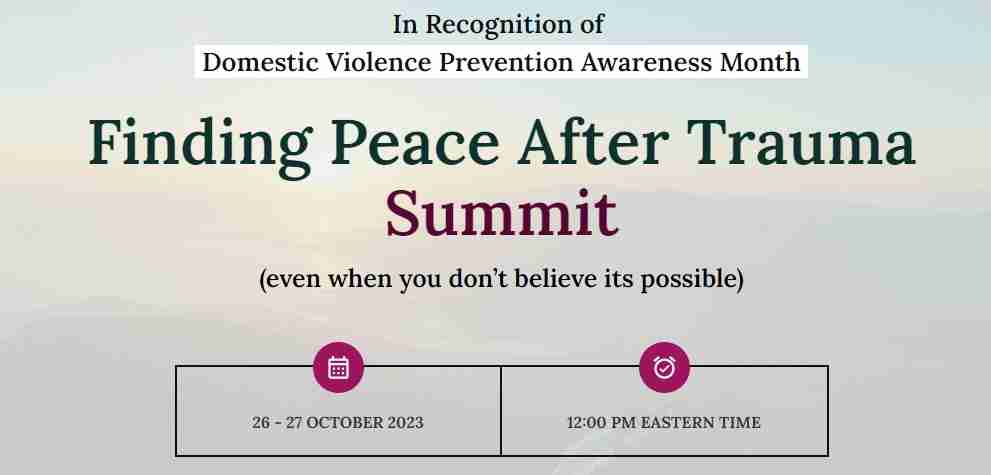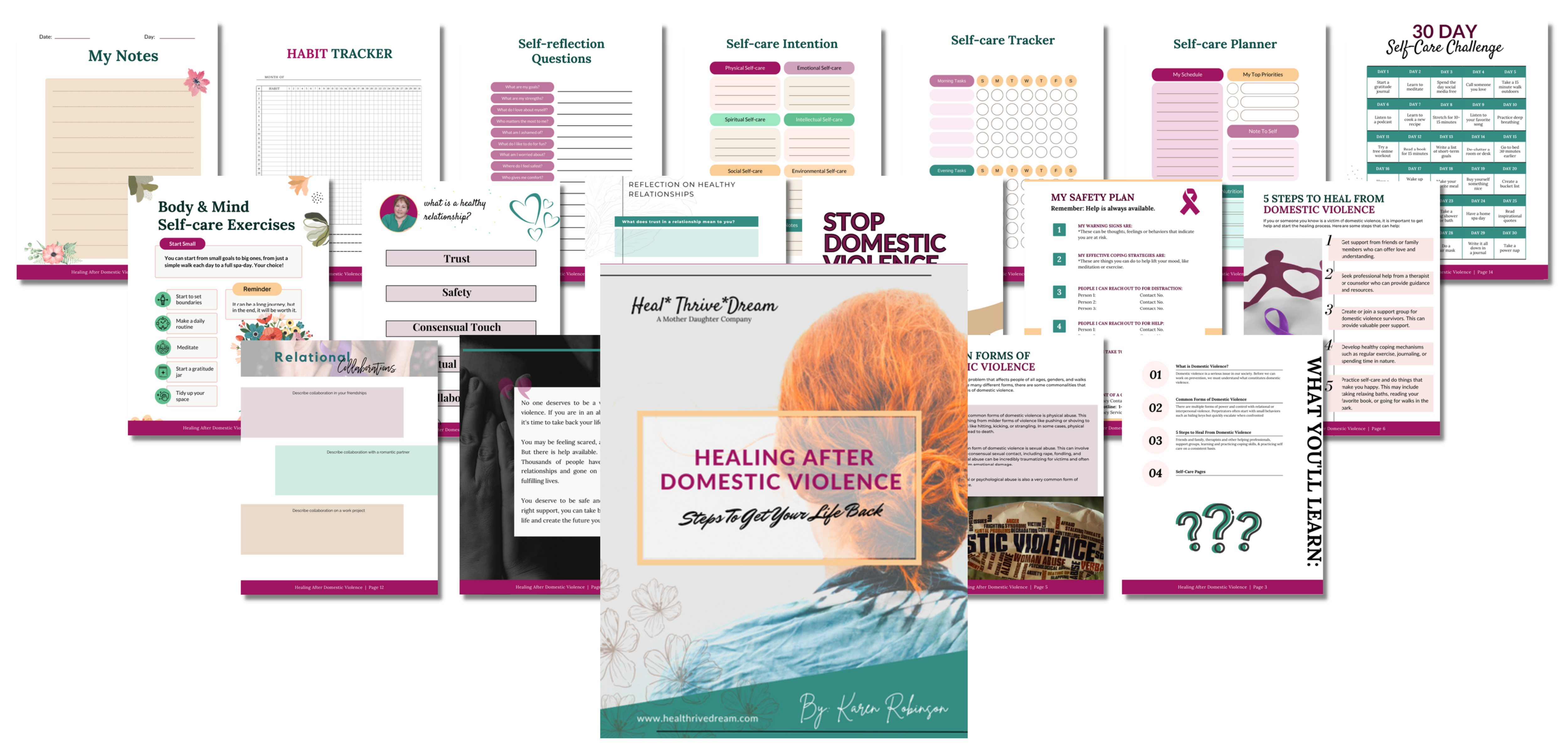Today is October 1st, the first day of the quarterly Ultimate Blog Challenge (UBC) & Domestic Violence Awareness Month. The goal for the UBC is to blog each day this month. I am traveling this month to two conferences, so I may miss a day or two. I decided to join the challenge anyway as it helps with consistency and accountability which I need! How about you?
In the United States, October is Domestic Violence Awareness Month. One in four women in the United States will experience domestic violence in her lifetime. This means that, every day, women across the country are being hurt by the ones who are supposed to love them. This month is a time to remember those who have lost their lives to domestic violence and to reaffirm our commitment to ending this epidemic. Violence against women continues to be prevalent around the world. Domestic violence does not discriminate.
Free Yourself: Discover Inner Healing and unlock the secrets of emotional recovery and gain tools to heal from trauma. Learn from leading experts and find the peace and resilience you deserve.
A triggering month for many
For survivors of domestic violence, this month can be a triggering time. reminders of the abuse they experienced are everywhere. For many survivors, dissociation is a coping mechanism that helps them get through the day. I decided to focus on dissociation today as this is one of the most disconcerting symptoms troubling survivors.
When we think of dissociation, we might think of it as something that happens when we space out or zone out. But dissociation is more than that. Dissociation is a mental health condition that can cause a person to feel disconnected from their thoughts, emotions, and physical reality. It's a coping mechanism that our brain uses to protect us from overwhelming trauma or stress. When we dissociate, we feel like we're outside of our bodies or in a dream-like state. This can help us to disconnect from the pain and fear that we're experiencing. This is commonly experienced during sexual assault. Dissociation can be a short-term response to a traumatic event, or it can be a long-term coping mechanism for people who have experienced chronic trauma. For some people, dissociation can be a way to stay safe when they don't feel like they have any other options.
There are both pros and cons to dissociating from reality. On the plus side, it can help people to cope with difficult situations and to block out painful memories. It can also be a way of coping with stress in the short-term. However, there are also negatives to dissociating. It can lead to problems functioning in everyday life, and it can make it harder to deal with the root cause of the stress or trauma. It can also become a habit that is hard to break. Common concerns I hear from clients is that they find it hard to concentrate at times with school or assignments at work. This is especially a problem when the task is on the boring side as the brain thinks they have a nifty trick… dissociation is a break away time. The problem lies in poor grades or low quality work which then directly impact how we feel about ourselves. Feelings of worthlessness, insecurity, and imposter syndrome start to sit in. Many survivors question their intelligence.
Treating dissociation
If you're struggling with dissociation, help and support is needed. If you're dissociating regularly, it's important to seek professional help. There are treatments available that can help you stop dissociating and start living in the present.
Treatment for dissociation often includes therapy and medication.
Therapy for dissociation can help a person learn to cope with their symptoms and triggers. It can also help them process trauma and work through any underlying issues. Medication may also be prescribed to help with dissociation symptoms. Treatment can be very effective in managing the condition and improving quality of life.
Therapy
- CBT (Cognitive Behavior Therapy) My favorite! I am an expert in CBT and love teaching clients how to identify their triggers, automatic thoughts, and how our thinking impacts our behavior. CBT techniques teach how to remove negative thoughts and distortions by healthy thought replacement. CBT also helps with many other mental health and physical health symptoms.
- DBT (Dialectical Behavioral Therapy) DBT is a spinoff of CBT. Instead of focusing on thoughts, the focus is more on emotional health. Distress tolerance and learning coping mechanisms are the important skills taught as you work on your “wise” mind (logical mind + emotional mind).
- EMDR (Eye Movement Desensitization Therapy). This is my least favorite technique. As clients are processing their trauma oratorically, therapist waves their finger or lights as clients follow the movement with their eyes. There is an emphasis on reframing memories.
Meds
Disclosure - I am not a medical doctor, a psychiatric nurse practitioner, or a psychiatrist. Information below is educational only. Please consult with your medical provider for a referral to an appropriate specialist for a medication evaluation.
- Benzodiazepines are typically contraindicated because they typically exacerbate dissociation. These meds are also addictive.
- Antidepressants can stabilize mood and reduce intrusive symptoms that trigger dissociation.
- A typical antipsychotic medications have been found to stabilize mood and to reduce anxiety and intrusive symptoms in people with dissociative disorders. May cause weight gain.
Resources to learn more about dissociation from NICABM

In conclusion, although more research is needed in the area of dissociation and its treatment, there is hope. There are many different types of treatment available, and with the help of a professional, survivors suffering from dissociation can find a way to heal.
Please hear more from Diana, Jennifer, and our other guest speakers at the "Peace After Trauma Summit." Please register now for this "not to be missed event!"

Register now for this life-changing event and take the first step towards a brighter future.




This is a very helpful article about domestic violence. I find it highly important the study psychological trauma. It opens an interest in me every time I come upon this type of article the understanding the different types of therapy treatment for dissociation symptoms. It becomes a big problem without supporting those people. Seeking a psychotherapist for a consultation is a big help.